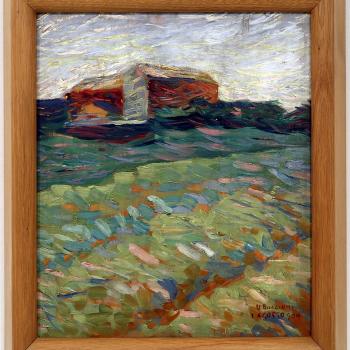
Maybe one or two of you noticed (may God bless me with so many readers!) that I have been away for the last couple of weeks. As you probably surmised from the title, I was in Europe: Germany and Italy to be precise. I had meant to write a goodbye before my trip, but the typical pre-airport rush swept me away. My apologies!
More importantly, both countries were lovely—rich in history, rife with differences, and bloated with the decadence an American can’t help but spot from 40,000 feet.
Of course as a Catholic, there is much to love in Europe—it’s almost an obligation. I was in Stuttgart, Bamberg, Regensburg, Nuremberg, Milan, Cinque Terre, and Florence. And, with the exception of the 50s-era cathedral in the first city, the churches were exquisite. I even had the pleasure of attending Mass in a village church on a hill. Hot, uncomfortable, entirely in Italian (which I don’t speak)—in a word, incredible. In fact, that liturgy was sung—and partly ad orientem—by a priest who couldn’t have been more than 35. And old Italian church ladies! If anyone is going to make it to heaven in such a haven of Last Men, it’s old Italian church ladies. But I digress.
The open land next to old, imposing edifices, the slower pace of life, and the ability to attend liturgy in a beautiful church (all the time!)—these are blessings for which most Americans can only hope. Rarely here do I ever have the luxury of just letting time pass, of breathing in the air, of savoring a glass of wine, of finding myself surrounded by a beauty worth contemplating. These are things available to Europeans (with their rich medieval, and at least in the Catholic and High Church countries, Baroque pasts), even if underappreciated. The spirit of the American Pilgrim—the hunger for work, the craving for self-sufficiency, the love of the boot straps metaphor—these things preclude the average American from such indulgence.
And so, you might suspect I had the perfect vacation.
Yet, I was very happy to come home, to end my break, to answer a million e-mails, Facebook messages, and texts; I was happy to rush through passport control to find my life dull, just where I’d left it.
There are, of course, the material comforts that I, fallen man, missed. Italy and Germany don’t care for air conditioning or screens, and sharing a bed with a friend for two weeks gets old (and sweaty) fast.
But it was more than that; it was a feeling I’ve grown accustomed to whenever I come back from Europe. I know my home and the people around it. It doesn’t even matter if I like that home or those people. What matters is that I am rooted to it, that I can move around it with some confidence (it’s something like what Heidegger called Spielraum).
No matter how wonderful the time spent in Europe (and it was nice, though it certainly had its own stresses), I am an American, even if I’m no nationalist, even if I really don’t even like America. My roots are here. And not in some vague ethno-nationalist way. The foods I enjoy, childhood associations, a sense of true belonging in the fullness of cultural and linguistic communication are all here.
This might seem a silly enough thing to say. But in an age of global capital, in an age rife with refugees, the movements of people, immigration, and constant flux, how many people lack this rootedness? How many people suffer inside every single day because they travel constantly for work or because their homes (their memories, associations, the Spielraum they knew) is gone—destroyed, kaput.
Simone Weil knew this; that’s why she wrote The Need for Roots. She understood that all the infrastructure, all the industry, would mean little for Europe after World War II if it didn’t help people feel at home, that is, loved.
And do we help with this? As Catholics how often do we comfort the un-rooted, whether refugee, exhausted worker, or homeless beggar? My friends, I stand accused—accused in my comfort and my at-home-ness.
What could be better, though, than a vacation that leads to a renewed consciousness of our duty to others?
Not much, though I will miss the wine.













